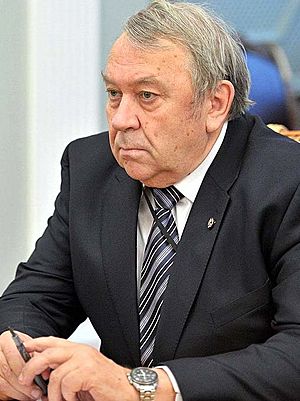Vladimir Fortov facts for kids
Quick facts for kids
Vladimir Fortov
|
|
|---|---|
 |
|
| President of the Russian Academy of Sciences | |
| In office 29 May 2013 – 22 March 2017 |
|
| Preceded by | Yury Osipov |
| Succeeded by | Valery Kozlov (acting), Alexander Sergeev |
| Deputy Chairman of the Government | |
| In office 17 August 1996 – 17 March 1997 |
|
| Minister of Science and Technology of the Russian Federation | |
| In office 17 August 1996 – 25 July 1998 |
|
| Personal details | |
| Born | 23 January 1946 Noginsk, Russian SFSR, Soviet Union |
| Died | 29 November 2020 (aged 74) Central Clinic and Hospital, Moscow, Russia |
| Alma mater | Moscow Institute of Physics and Technology |
| Profession | Academic of Russian Academy of Sciences |
Vladimir Yevgenyevich Fortov (Russian: Владимир Евгеньевич Фортов; born January 23, 1946 – died November 29, 2020) was a famous Russian physicist and a politician. He led the Joint Institute for High Temperatures for many years. Later, he became the president of the Russian Academy of Sciences. His main work involved studying thermal physics, shock waves, and plasma physics.
Contents
Who Was Vladimir Fortov?
Vladimir Fortov was born in Noginsk, Russia, in 1946. He became a very important scientist and leader in Russia. He was known for his deep understanding of physics. He also held important roles in the Russian government.
Fortov's Early Life and Education
Vladimir Fortov studied physics at the Moscow Institute of Physics and Technology. He graduated from this university in 1968. He continued his studies and earned his first advanced degree in 1971. In 1976, he received his highest degree, called a Doctor of Sciences. He started teaching as a professor at the same university in 1982.
Fortov's Career in Science
From 1971 to 1986, Fortov worked at the Institute of Problems of Chemical Physics. This institute is located in Chernogolovka. After that, he also started working at the Joint Institute for High Temperatures. In 1992, he became the director of this important institute.
Fortov's Role in Government
Vladimir Fortov also played a part in the Russian government. From 1993 to 1997, he was in charge of the Russian Foundation for Basic Research. This group helps fund important scientific studies. In 1996, he became the head of the State Committee of Science and Technology. He later served as a minister for science and technology.
Leading the Russian Academy of Sciences
In 2013, Vladimir Fortov was chosen to be the president of the Russian Academy of Sciences. This is a very high honor for a scientist in Russia. The president of Russia, Vladimir Putin, officially appointed him to this role.
In 2017, there were new elections for the president of the Academy. Fortov was one of the candidates. However, all candidates suddenly withdrew from the election. Fortov then resigned a few days later, explaining it was due to health reasons.
What Did Fortov Study?
Fortov's scientific work focused on several areas. He studied thermal physics, which is about heat and how it moves. He also researched shock waves, which are powerful waves of pressure. Another area of his study was plasma physics. Plasma is a state of matter, like a superheated gas. His research was also used in practical ways, especially for making energy.
Fortov's Passing
Vladimir Fortov passed away on November 29, 2020, in Moscow. He died after becoming sick with COVID-19.
Awards and Recognition
Vladimir Fortov received many awards for his work. These awards came from Russia and other countries.
National Awards from Russia
- Order of the Red Banner of Labour (1986)
- USSR State Prize (1988)
- Order "For Merit to the Fatherland" (IV class) (1996)
- State Prize of the Russian Federation (1997)
- Medal "In Commemoration of the 850th Anniversary of Moscow" (1998)
- Order "For Merit to the Fatherland" (III class) (1999)
- Jubilee Medal "300 Years of the Russian Navy" (2000)
- Order of Honour (2006)
- Order of Friendship (2011)
- Order of Alexander Nevsky (2013)
- Order "For Merit to the Fatherland" (II class) (2016)
International Awards
- Hannes Alfvén Prize (2003)
- UNESCO Albert Einstein medal (2005)
- Order of Merit of the Federal Republic of Germany (2006)
- Legion of Honour (2006)
- Dr. Phil. Nat. Honoris Causa of Goethe University Frankfurt (2010)
- Global Energy Prize (2013)
See also
 In Spanish: Vladímir Fórtov para niños
In Spanish: Vladímir Fórtov para niños
 | Lonnie Johnson |
 | Granville Woods |
 | Lewis Howard Latimer |
 | James West |

